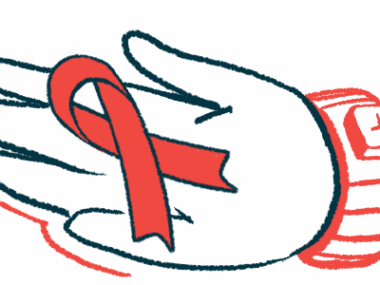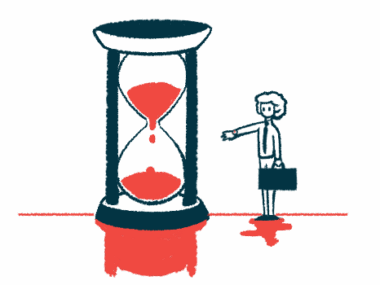When a loved one has ALS, the effects of trauma are ever present
As the disease progresses, patients, caregivers, and family must adapt
Written by |

As a caregiver for my husband, Todd, who has ALS, I’ve experienced numerous traumas in the 14 years that we’ve been living with the disease.
Our lives were shattered with Todd’s diagnosis, which occurred when our daughter was 4 and our son was 9 months old. I was so stressed that I couldn’t sleep. A prognosis of two to five years? How would I raise our two children on my own?
In the years since, our children have grown up and gotten to spend much more time with their dad than we’d expected. Even so, a dark cloud lingers as the disease’s progression continues to advance.
When Todd began falling, I wanted him to stop walking, but the disease had taken so much already that he wasn’t ready to give up another thing yet. “As soon as I start using a wheelchair, I won’t get out of it again,” he said at the time.
We borrowed a Hoyer floor lift from an ALS loan closet, and I learned to use it to get Todd up and off the ground. I still worried that he’d get hurt.
Sure enough, he once fell and bloodied his face. I still remember the stress I felt while picking gravel from his wound. Todd began using a three-wheeled scooter around the yard, but my worry continued until a year later, when he began using a wheelchair full time.
The source of that trauma ceased just as Todd was no longer able to sleep through the night. I’d wake up with him to adjust his arms, scratch his itches, and turn him. I had trouble sleeping because I never knew if he’d need me in five minutes. I became increasingly sleep-deprived and was not in a good place physically or mentally. Sleep, after all, is a basic human need.
We raised funds and hired nighttime caregivers, and I gradually learned to relax and sleep at night. But whenever a caregiver canceled, I’d start shaking. My body remembered the sleep-deprived past, and I’d lived like that far too long.
The stress response when caregivers cancel has dissipated somewhat, but I still have to coax myself into staying calm. Tonight’s caregiver is sick, and while I sent texts to find a replacement, I kept telling myself, “You can handle one night of bad sleep.” Nonetheless, my anxiety rose as the “Sorry, I can’t” replies came in, until my mom said she could cover until 4 a.m.
We also faced the trauma of Todd choking on food. I performed a Heimlich maneuver on him once at a restaurant in the Mall of America, and I remember people staring. I dislodged the food, and we continued our conversation. He used to choke often during meals, but he’s since learned to chew his food thoroughly and be selective about what he consumes. I haven’t had to give him the Heimlich maneuver in months, but I still keep an eye on him while he eats.
The traumas continue, even to this moment. I just returned from an interruption from writing this column to help Todd clear mucus from his lungs. I used his cough-assist machine and performed manual-assist coughs. That took 10 minutes, but sometimes it goes on for an hour or longer. So far, I’ve been able to clear his lungs every time, but the stress of those life-and-death moments persists.
When there’s no safe space
In a recent episode of “The Happiness Lab” podcast, psychology professor Laurie Santos talked about post-traumatic growth with happiness and well-being advocate Karen Guggenheim and clinical psychologist Edith Shiro. They discussed finding purpose and learning compassion through suffering, which resonated with me. But I felt discouraged when Shiro said we have to get to a safe space first.
“If I’m in the middle of war,” Shiro said, “if I’m right now in Ukraine or in the Middle East, and I want to go into radical acceptance — no, sorry, that’s not the place. The people there have to be in survival mode. You have to still be in denial in order to stay alive. So it’s only when you feel that you’re in a safe space, and only when your body actually recognizes a safe place, that’s when you can begin to go into this radical acceptance.”
But what about people who live and die in a war zone? Can people grow if the war never ends?
What about those of us who have been ALS caregivers for years? What about people who have ALS? There’s no safe place on the other side of ALS for them.
I’m left pondering how we can best live amid trauma, not just in its aftermath.
Note: ALS News Today is strictly a news and information website about the disease. It does not provide medical advice, diagnosis, or treatment. This content is not intended to be a substitute for professional medical advice, diagnosis, or treatment. Always seek the advice of your physician or other qualified health provider with any questions you may have regarding a medical condition. Never disregard professional medical advice or delay in seeking it because of something you have read on this website. The opinions expressed in this column are not those of ALS News Today or its parent company, Bionews, and are intended to spark discussion about issues pertaining to ALS.







Adeela Al-Khalili
On Wednesday May 8, 2024 my beautiful 46 year old son, cyber security analyst, father of a 19 year old gifted and talented daughter passed from ALS after getting the official diagnosis of December 2023. Devastitation doesn't come close to how our family is suffering. He was taking the Relyvrio, Radicava, and supplements. Three of us kept 24 hour vigils, bathroom trips and whatever feedings he could accept because the breathing machine was needed throughout the day and night. We had home health; the ALS Closet provided lots of equipment and support. May Almighty God have mercy on my son, and all those suffering with this damned disease.
Kristin Neva
I'm sorry for your loss.
Cathy pallman
I am so sorry for you and your family. My husband was diagnosed in feb with als. We are struggling with the prospects of this terrible disease.
Kristin Neva
So tough to come to terms with the diagnosis, Cathy. It takes time.
Nicole D
My dad passed away in 2019 when I was eighteen after three short (yet somehow endless) years of surviving. Thank you for helping me feel less alone.